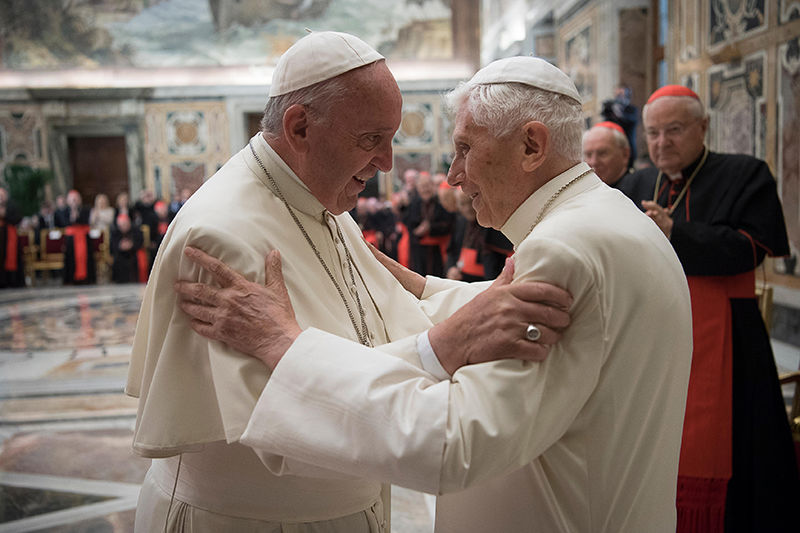Pope Francis is celebrated for his humility and rightly so. This is, after all, the pontiff who began his reign by kneeling and asking the crowd in St. Peter’s Square to pray for him before he delivered a formal blessing, who returned to a Rome residence to pay his own bill and pack his own bag, and who declined to live in the sumptuous papal apartments.
However, there’s also a sense in which Pope Francis is a strong personality, comfortable in command and possessing a virtually unwavering confidence in the correctness of his own judgments. That’s far from arrogance, of course, but for those who watch him in action, there’s never any doubt about who’s in charge.
If you want a pope filled with a sense of his own limitations and imperfections — not haunted by them, but also remarkably open in acknowledging why they may have made him unsuited to lead, at least for very long — then the man you’re really looking for is Benedict XVI.
We got another reminder of the point on Sept. 8, with the release of excerpts from a new interview book with Benedict XVI by German journalist Peter Seewald, with whom he’s collaborated several times in the past. Titled “Final Conversations,” portions of the book were published Thursday in the Italian daily Corriere della Sera, the German weekly Die Zeit and daily Bild.
While insisting that he was not pressured by anyone to resign the papacy in February 2013, and that it was his own free decision, Benedict concedes that the demands of running a complex religious multinational occasionally exceeded what he perceived, anyway, as his capacities.
“My weak point perhaps is a lack of resolve in governing and making decisions,” he said. “Here, in reality, I am more a professor, one who reflects and meditates on spiritual questions. Practical governance was not my forte, and this certainly was a weakness.”
Just as a thought exercise, one might profitably reflect on how many former titans of the earth, whether presidents or prime ministers, corporate CEOs or founders of social movements, would be willing to confess in an interview they would surely understand to be their last, that they were actually not particularly suited to do the thing they had been put in leadership to do.
Modestly, Benedict goes on to say that while governance may not have been his strong suit, he cannot think of himself as a total flop.
“But I don’t see myself as a failure. For eight years I did my service,” he said, and many people found a new path to their faith.
In all honesty, Benedict easily could have fended off these challenges in an entirely different way. Yes, there were obvious failures of governance during his eight-year reign, such as the disastrous mishandling of the rehabilitation of a Holocaust-denying bishop and the Vatican leaks affair that culminated in the arrest, conviction and eventual pardon of his own butler.
Yet for every such breakdown, there was also a compelling success.
For instance, it’s a fact of history that Benedict, both before and after his election to the papacy, was the Vatican’s chief reformer on the single most chronic source of heartache for the Catholic Church in the last two decades, which is the clerical sex abuse scandals.
It was Benedict, as Cardinal Joseph Ratzinger, who pushed through aggressive new rules under St. John Paul II that expedited the removal of abusers from the priesthood, and Benedict as pope who expelled more than 400 abusers in 24 months during his final two years as pope — representing, for the record, more than one percent of the total number of Catholic priests worldwide.
It was also Benedict XVI who launched historic reforms in terms of Vatican money management, including the audacious and essentially unprecedented decision to subject the Vatican to an outside secular inspection in the form of the Moneyval process, referring to the Council of Europe’s anti-money laundering agency.
A leader with that track record might well be inclined to mount a defense of his legacy, to testily insist that history will be more kind than his contemporaries, and so on. Instead, Benedict is apparently content to acknowledge that his successor, Pope Francis, is more a man of government, to celebrate his success and to leave it at that.
Benedict did offer one more defense of himself in the book, which is to claim that he dismantled a so-called “gay lobby” within the Vatican, but even then he minimized the significance of it, claiming that it was a tiny constituency and that anyway it was identified by a commission of cardinals rather than by him.
In other words, this is simply not the testament of a leader whose primary concern is his own reputation or legacy, but rather the health of the Church to which he dedicated his life.
Benedict told Seewald that he passes his days now in part preparing for his last, definitive meeting with his maker.
“The important thing isn’t imagining it, but living with the knowledge that all our lives are headed toward this encounter,” he said.
Of course, no one knows when that encounter for Benedict may come, but when it does, it seems clear from his new book that he won’t be carrying the sin of undue pride on his shoulders.

